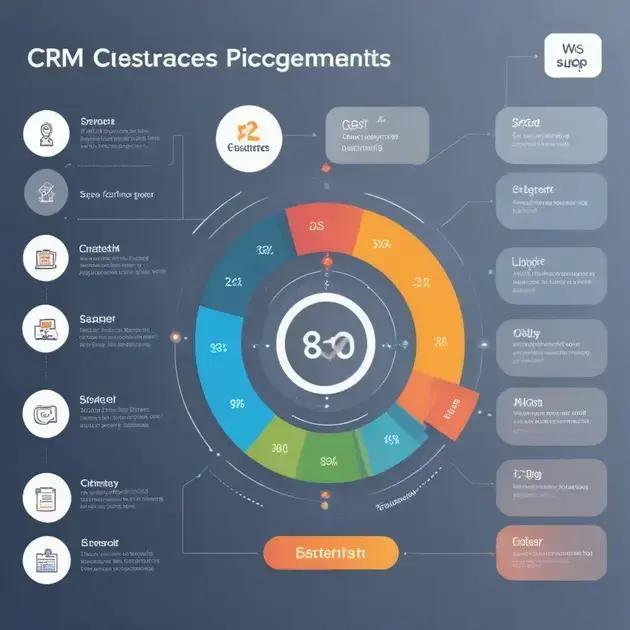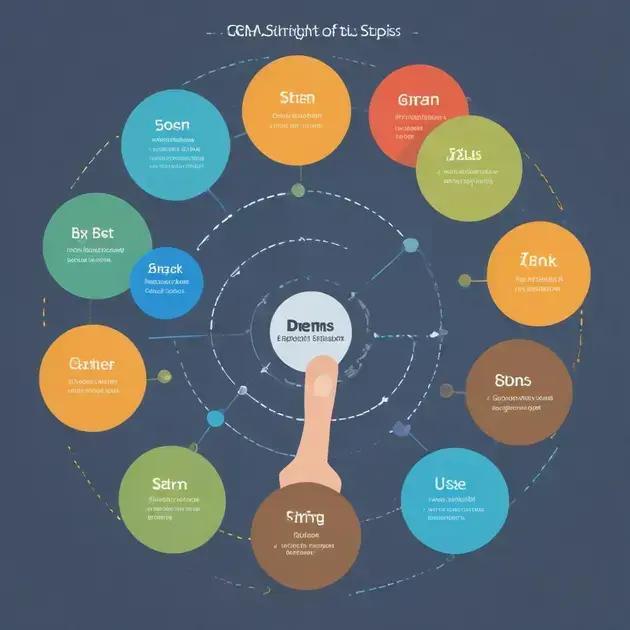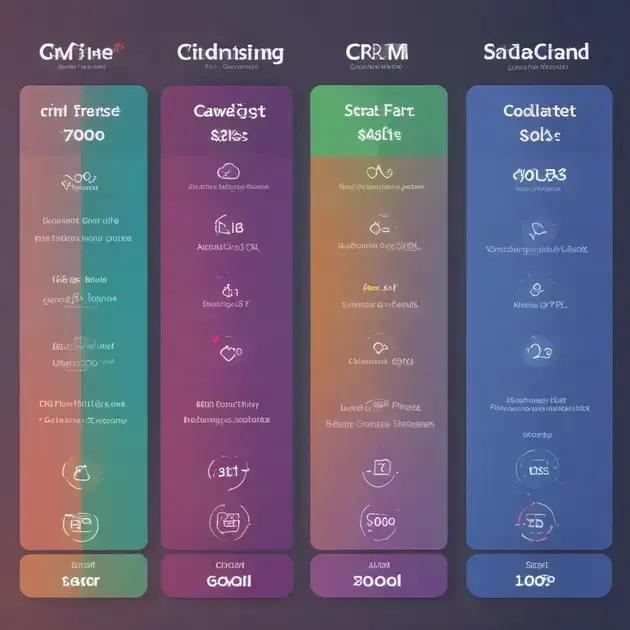When comparing CRM pricing, consider key factors such as features, user limits, hidden fees, and scalability. Understanding these elements ensures you select a CRM that fits your business needs and budget effectively.
Compare CRM pricing is essential for businesses looking to optimize their customer relationship management. With so many options available, understanding the pricing landscape can be daunting. In this article, we will explore affordable CRM solutions, examine various pricing models, and help you make informed decisions about which CRM fits best based on your budget and business needs.
Understanding CRM Pricing Models
Understanding CRM pricing models is crucial for businesses seeking the right customer relationship management tool. There are several common models that companies use to price their CRM systems. Each model has its unique benefits and considerations.
Subscription-Based Pricing
Many CRM platforms operate on a subscription basis, where businesses pay a monthly or annual fee. This model is popular for its predictable costs and low initial investment. Features may vary based on the subscription tier chosen, allowing businesses to scale their CRM usage according to their needs.
One-Time License Fee
Some CRMs are sold with a one-time license fee, allowing businesses to own the software outright. Although the upfront cost can be high, this model can save money in the long run. However, companies must also consider ongoing maintenance and upgrade costs, as these systems often require periodic updates.
Freemium Model
The freemium model allows users to access a basic version of the CRM for free. This model is attractive for startups and small businesses that wish to test the system before committing to a paid plan. While the free version may have limitations, it provides an opportunity to evaluate the CRM’s features.
Pay-As-You-Go
Some CRMs offer a pay-as-you-go model, where businesses pay based on usage. This approach can be cost-effective for companies with fluctuating customer management needs, as it allows for flexibility in payments.
Tiered Pricing
Tiered pricing offers several packages at different price points. Each tier typically includes a set of features suited for various business sizes and needs. This allows businesses to choose a package that aligns with their requirements and budget, making it easier to upgrade as they grow.
Factors Influencing CRM Pricing

Several factors influence CRM pricing that businesses should consider when evaluating different systems. Understanding these elements helps in making an informed decision.
Features and Functionality
The number and quality of features offered by a CRM system play a significant role in its pricing. Basic CRMs may provide essential functionalities like contact management, while more advanced options include automation, analytics, and AI capabilities. As features increase, so does the cost.
Number of Users
Many CRMs charge based on the number of users or seats. The more users you need, the higher the overall cost. It is essential to consider your team size and who will require access to the CRM.
Customization Options
CRM systems that allow extensive customization and integration with other tools generally come at a premium. Customization can help personalize the CRM to fit specific business processes, but it often involves additional costs for setup and maintenance.
Support and Training
The level of customer support and training options also impacts CRM pricing. Some providers include comprehensive support in their packages, while others may charge extra for priority assistance. Training programs can also affect costs, as onboarding your team effectively is crucial for successful CRM adoption.
Contract Length
Some CRM providers offer discounts for long-term commitments. Committing to a longer contract may reduce monthly fees, while short-term plans often have higher rates. Businesses must weigh their needs and future plans when considering contract length.
Top CRM Platforms Compared
When choosing a CRM, it is essential to evaluate the top CRM platforms available. Here we compare several leading options to help you make an informed choice.
Salesforce
Salesforce is one of the most popular CRMs. It offers a robust suite of tools for sales automation, marketing, and customer service. Its extensive customization options allow businesses to tailor the system to their specific needs. However, Salesforce can be more expensive compared to other options, especially for larger teams.
HubSpot CRM
HubSpot CRM is known for its user-friendly interface and is often free for basic features. It integrates well with other HubSpot tools and offers excellent marketing automation features. This makes it a great choice for small to medium-sized businesses looking to scale.
Zoho CRM
Zoho CRM is a cost-effective solution that provides a comprehensive set of features including sales automation, analytics, and customer support tools. Its pricing is competitive, making it an attractive option for startups and small businesses.
Microsoft Dynamics 365
Microsoft Dynamics 365 offers strong integration with other Microsoft products. This CRM is versatile and can suit a variety of business sizes and sectors. While its features are powerful, the learning curve can be steeper for new users.
Freshsales
Freshsales is known for its intuitive design and is designed to enhance the sales process. It includes features like AI-based insights and customizable sales pipelines. Its affordable pricing structure appeals to small businesses with limited budgets.
How to Choose the Right CRM

Choosing the right CRM system for your business can be challenging. Here are key steps to help you make the best decision.
Define Your Needs
Start by identifying your business requirements. Consider what features are essential for your team, such as sales automation, customer support, and reporting capabilities. Understanding your priorities will help you narrow down your options.
Set a Budget
Determine how much your business can afford to spend on a CRM. Pricing can vary widely depending on the features and the number of users. Setting a budget will prevent overspending and help you focus on options that meet your financial criteria.
Consider User Experience
The usability of the CRM is crucial. Test different systems to see which one your team finds most intuitive. A user-friendly interface can greatly enhance adoption rates among your staff and improve daily operations.
Request Demos and Trials
Once you have identified a few potential CRMs, request demos or sign up for free trials. This allows you to explore features, navigation, and overall user experience before making a commitment.
Evaluate Customer Support
Strong customer support is vital for resolving issues while using a CRM. Check the support options available, such as live chat, phone support, and training resources. Ensure that the vendor provides adequate help whenever you encounter problems.
Common Pitfalls in CRM Pricing
Understanding common pitfalls in CRM pricing can prevent businesses from making costly mistakes. Here are key pitfalls to watch out for.
Overlooking Hidden Fees
Many CRM providers advertise low base prices but fail to mention hidden fees for additional features, user licenses, or support services. Always read the fine print and clarify costs with the vendor before committing.
Ignoring Scalability
Some CRMs may seem affordable initially but become costly as your business grows. It’s essential to choose a CRM that can scale with your company, so you don’t end up paying significantly more for a larger user base or extra features.
Not Considering Total Cost of Ownership
Businesses often focus solely on monthly subscription costs, ignoring other expenses such as implementation, training, and maintenance. Calculate the total cost of ownership to understand the full financial picture.
Underestimating Training Needs
A big mistake is assuming that the CRM is user-friendly enough for your team to use without training. Investing in proper training can save time and money down the road, ensuring everyone can use the system effectively.
Falling for Free Trials Without Research
Free trials can be enticing, but diving into a trial without researching the CRM’s features and limitations can lead to poor choices. Take the time to explore reviews and comparisons before starting a free trial to ensure it aligns with your needs.
In Summary, Choosing the Right CRM is Key
Carefully selecting the right CRM can significantly affect your business success. Understanding CRM pricing, the factors influencing it, and common pitfalls helps you make a better decision.
By evaluating features, considering your budget, and seeking necessary support, you can find a CRM that fits your needs. Also, make sure to be aware of hidden costs and scalability options to avoid surprises down the line.
With the right CRM, your business can enhance customer relationships, improve efficiency, and drive growth. Take the time to research and choose wisely to ensure you’re set for success.
FAQ – Frequently Asked Questions About CRM Pricing
What factors should I consider when evaluating CRM pricing?
Key factors include the features offered, number of users, customization options, support services, and potential hidden fees.
Are there hidden costs associated with CRM systems?
Yes, many CRM providers have hidden costs related to additional features, user licenses, and customer support. Always review the pricing details carefully.
How can I ensure that my chosen CRM will scale with my business?
Look for CRMs that offer tiered pricing or flexible plans that can accommodate a growing number of users and additional features as your business expands.
What role does training play in the successful use of a CRM?
Proper training is essential to ensure your team can effectively use the CRM, which helps maximize its benefits and improves user adoption.
What is the benefit of free trials for CRM systems?
Free trials allow you to explore the features and usability of a CRM before committing, helping you make a more informed decision.
How can I avoid common pitfalls in CRM pricing?
By thoroughly researching your options, understanding total costs, and preparing for growth, you can avoid hidden fees and choose a suitable CRM.




